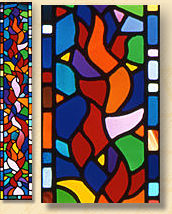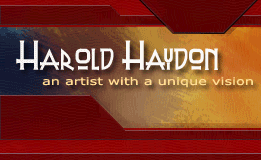 |
|
 |
|
Haydon continued to be active in the Art community
well after his teaching years at the University of Chicago.
He and Virginia
divided their time between their homes in Chicago and Vermont.
In Chicago, Haydon had a large studio equipped for almost
any project. In Vermont, he had less expansive quarters
but he
did have a place, that he loved, for working in good natural
light. He accomplished quite a bit while in Vermont and,
by 1990, had completed a set of paintings known as the
Vermont
Window Series. Some of these had been included in his 1983
exhibition, Harold Haydon, A
50 Year Retrospective.
The later ones were presented in his last Exhibit in 1992.
In the late 1980’s and early 1990’s Haydon began preparing for his 1993 exhibit
at The Ukrainian Institute of Modern Art in Chicago. A number of smaller works
were presented as well as some of his sketch books, self portraits, and Vermont
paintings. One work, The Firemen, 1990, oil
on canvas, 60”X48", PA0373 was
completed just before, and specifically for, the show.

Rockefeller Memorial
Chapel
Stained Glass
|
This was Haydon’s last
exhibition and it drew many friends from all over the art community who wished
to recognize both his friendship and contribution to Art over the last 60 years.
Haydon’s murals, mosaics, stained glass work and tapestries can be found in public
buildings, private institutions and religious buildings including Rockefeller
Memorial Chapel, at the University of Chicago, and the temples and churches previously
mentioned in this essay. His paintings can be found in public and private institutions
as well as in private collections, all over the world.
Harold Haydon's kindness as a person and open mindedness as an artist were his
signature traits as an art educator and critic. His students always received
the most support and encouragement he could give. This was the same approach
he took to his role as an art critic. Always a champion for local artists, Haydon
looked for the best in the young emerging artists' efforts. His role was to spark
an interest among Chicagoans in their artistic community as well as nurture and
inspire artists to continue producing their best works. In doing so he was instrumental
in forever changing the face of Art in Chicago.
|
|
|
 |
|
 |
|



